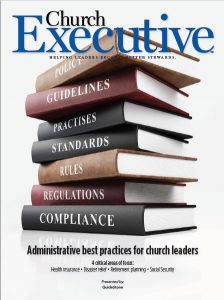For the past several months, it has felt like there is a disaster around every corner.
From August through October, hurricanes Harvey, Irma, Jose and Maria brutalized thousands of communities on the United States mainland and in the territory of Puerto Rico. The hurricanes were followed quickly by a swift-moving wildfire that ravaged a large swath of Northern California. Now, we’re looking toward a spring season likely to bring tornadoes.
Yet, in the chaotic aftermath of natural disasters like these, there’s one thing you can count on: churches reaching out to help.
By Jim Welch, Ed.D.
![]() Some congregations send supplies. Others provide funds to cover immediate needs. And then there are those who prefer the hands-on work of removing debris, recovering what is salvageable and rebuilding what was lost.
Some congregations send supplies. Others provide funds to cover immediate needs. And then there are those who prefer the hands-on work of removing debris, recovering what is salvageable and rebuilding what was lost.
Like many of the churches we serve, you might be planning to send mission teams to minister in a disaster-stricken area this spring. So, before you go, GuideStone® and the risk management experts at Brotherhood Mutual® encourage you to pack these six things in the toolboxes of your disaster relief mission team.
#1: A local partner
Working with someone who knows the affected area and its unique needs can save you time, money and frustration. By having a contact at a local church or ministry, you can more easily access information about the need, details regarding available resources and directions for adhering to the area’s laws.
#2: A trusted team leader
While it is best to work with a local partner, that individual will likely not have the capacity to direct your team’s day-to-day activities. Instead, choose an experienced mission team leader from your church, preferably someone with training and experience in both mission work and the hands-on work you will be doing. Your leader should be competent and comfortable with the task at hand, be it construction or cooking.
#3: Healthy team members
Working in a disaster zone often requires sacrificing comforts like air conditioning, warm showers and comfortable beds. That’s why it’s important to send healthy team members who are physically able to manage the work and any associated challenges.
In addition to being in good physical health, each member of your team should be up-to-date on immunizations and covered by their own health insurance.

#4: Accommodation plans
Determine in advance where your team will sleep, eat and shower, because these staples might not be readily available in disaster areas. If your team is able, consider blessing the community by bringing your own campers or tents, food and supplies, thereby reserving what’s available for local people who’ve been displaced from their homes. Be sure to work with your local partner to coordinate these arrangements ahead of time.
#5: Reliable transportation
Your ministry should provide the team with its own transportation for the entire length of the trip. Use a truck, sport utility vehicle or small van to haul your trailers, but please do not hitch a trailer to a 15-passenger van, as they already carry a high risk of rolling over.
If you are borrowing vehicles, check with your church’s insurance provider to ensure they will be covered under your policy. Also make sure that individual team members who drive their own vehicles have the required coverage, too.
#6: Adequate insurance protection
You never expect disaster to strike your own team, but it’s always a good idea to be prepared for the unexpected. This is why many churches choose to provide supplemental accident and sickness coverage for the individuals they are sending out. Mission trip-specific insurance products, such as Faith Ventures, can provide an extra layer of protection for your team while also helping you be a good steward of your resources.
No matter where your mission trips take you, it’s important to assess the risk and be prepared before you go. Packing your mission trip toolbox in advance gives you the freedom to focus on blessing others once you’re on location.
Jim Welch, Ed.D., is the Director of GuideStone Property & Casualty®, where he has served churches and ministries since 1994. GuideStone’s team of experienced church insurance professionals work with Brotherhood Mutual to provide the specialized protection churches need. Visit GuideStonePropertyCasualty.org to see how GuideStone and Brotherhood Mutual can help protect your ministry.


